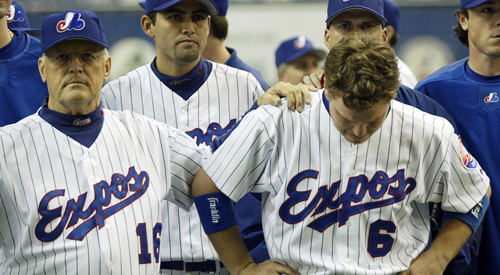
The Montreal Expos: Five years later
September 29, 2004, was a somber day in Montreal.
The Expos, a summer fixture for over 30 years, were playing their final game. The mood changed several times inside the Olympic Stadium that night. There was a sense of celebration as a banner was unfurled and acknowledged the Expos as baseball’s best team in 1994. There were feelings of anger, which were expressed by golf balls being thrown on the field, resulting in a stoppage of play and several warnings. Finally, there was acceptance.
The Expos were leaving the city they called home since 1969. They were moving to Washington D.C. and would ultimately re-emerge as the Nationals. Despite the outcome of the final match – a 9-1 loss to the Florida Marlins – the 31,395 in attendance applauded and began the process of moving on.
The Nationals are about to embark on their fifth season in the U.S. capital and subsequently, the city of Montreal is about to embark on its fifth summer without professional baseball. The Expos’ departure was not surprising as there had been talk since the mid-90s of the team leaving.
Now that the moment has occurred and significant time has passed, it’s time to evaluate how Montrealers have managed since Major League Baseball’s owners (with the exception of one: Baltimore’s Peter Angelos) voted in favour of moving the team almost five years ago.
The Expos’ final years were bleak. The club couldn’t afford to keep their best players. There was a failed plan to build a new stadium (Labatt Park). There were even times when the team did not have a television and radio deal with English broadcasters.
[php snippet=1]
The situation was dreadful to the point that Major League Baseball was forced to take over the team after Montreal’s former owner, Jeffrey Loria, become the owner of the Marlins in 2002 and took the Expos’ infrastructure with him to Miami. Under MLB’s control, Montreal was given just the bare essentials to survive, while the league looked for a new owner and a city to relocate the team.
The league also attempted to disband the Expos through contraction, but was unsuccessful. In the midst of all this, attendance at the Olympic Stadium was going up slightly (average of 7,647 in 2001 and 9,048 in 2002, according to ESPN.com), but was still quite low compared to the other clubs. As a result, MLB moved a portion of the Expos’ home games to Puerto Rico during the 2003 and 2004 seasons.
Sylvain Tremblay is the President of Encore Baseball Montreal, a not-for-profit organization that works to maintain the interest and preserve the history of baseball in Montreal and the province of Quebec. He notes that there is still a little resentment towards Loria and MLB Commissioner Bud Selig for what they did to the Expos, but points out that most fans had already anticipated the club’s departure.
“As time goes by, folks identify mainly the strike in 1994 and the failure of Labatt Park as the real causes of the Expos’ departure,” says Tremblay. “Even in 1999, (former president and owner) Claude Brochu was talking about moving the team to Washington D.C.; so fans thought to themselves that the team would move any year, and I guess over the time, it just erased the passion.”
Montrealers have found ways to fill the void left by the Expos. There’s the city’s other professional sports teams such as the Canadian Football League’s Alouettes and the United Soccer League’s (First Division) Impact; both of which have solid support. Tremblay also acknowledges a number of free festivals and activities that are held in Montreal during the summer.
But not surprisingly, when it comes to Montreal’s sporting scene, there’s only one team that occupies the majority of available media and the minds of sports fans in the city.
“The Montreal Canadiens are now drawing nearly 100 per cent of the ‘sports space’, including the empty space left by the Expos,” explains Tremblay. “You listen to the radio, you watch television and you hear about the Habs seven days a week, including in the middle of July. There is no significant baseball coverage in the newspaper, or on TV and radio.”
“There are some baseball games broadcasted on the French sports network and the audience is pretty nice,” he continues. “There is a baseball fanbase in Montreal. It’s still there. But for the ordinary fan, it’s tough to fill your appetite for baseball.”
Despite the Expos’ departure, baseball has been able to maintain its esteem in Quebec. However, Tremblay says that baseball has been competing lately with soccer, which has gained popularity in several regions.
“Parents like the fact that a soccer game lasts one hour and is simple for everybody,” he states. “Baseball diamonds are transforming into soccer fields. At the same time, Quebec kids are still joining baseball teams in their area and registration is still strong.”
After all that had transpired with the Expos, it’s hard to imagine the return of professional baseball to Montreal. But there are those who still hang on to this dream, regardless of the how difficult it is to have a successful team in the standings and in the community.
“[Montreal] has a rich baseball heritage,” says Tremblay, who believes it could possibly happen in 10-15 years. “All we need is a motivated and wealthy individual to build a stadium and move a moribund team to Montreal… I hear folks almost everyday reminiscing about the good times they had watching a game at the ‘Big O’ or listening to (French sportscaster) Jacques Doucet’s play-by-play on the radio. It would not take long to ignite the passion again.”
[php snippet=1]

